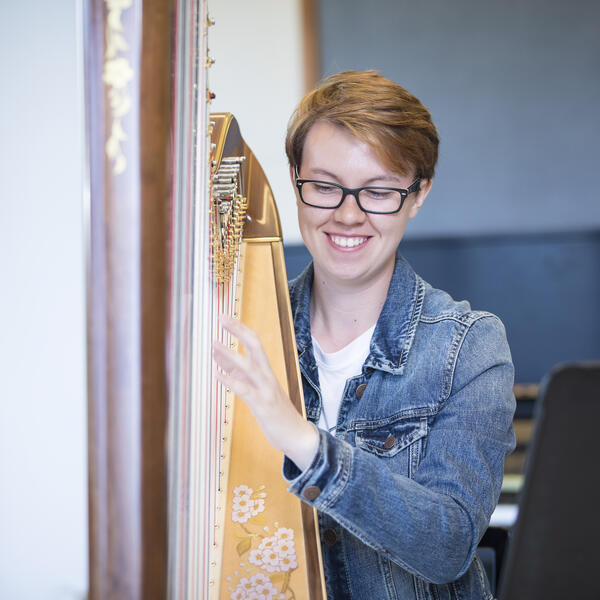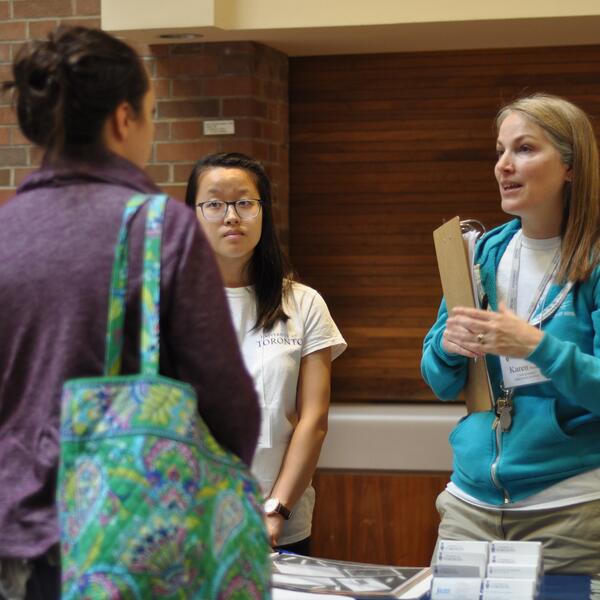Bachelor of Music in Performance Harp
Overview
What to expect
Extensive individual and ensemble performance training, as well as ample opportunities to perform in solo, chamber, ensemble, and orchestral settings, comprise the core of this four-year brass performance degree. Students receive instruction in Classical, Romantic, twentieth-century, and contemporary repertoire. Small class sizes, a closely knit community, and ample opportunities for collaboration across years highlight the program. Harp students become creative, entrepreneurial performers who respect and understand the traditions of music while embracing future directions!
Why it stands out
Students receive individualized attention from internationally renowned faculty with wide experience as educators, performers, entrepreneurs, and researchers. The program provides multiple performance experiences in solo, chamber, ensemble, and orchestral settings on and off campus. Students join a community of exceptional, mutually supportive peers taught by accomplished faculty and distinguished guest performers.
Who it's for
Students seeking careers as freelance performers, orchestral players, and/or private studio or institutional teachers are well suited for this degree. The program is ideal for curious, motivated, collaborative, and versatile students who are are passionate about music, demonstrate potential for musical growth, and are willing to take advantage of the many opportunities that are available to them.
Outcomes
Opportunities for study
Students engage in private applied learning, participate in masterclasses by resident and guest teachers, and benefit from a wide choice of performance electives. They acquire a thorough understanding of performance styles and literature. They have options of exploring pedagogy, music from other traditions, conducting, performance skills, and classes that focus on the business aspects of music.
Paid professional work both on and off campus is facilitated through our Music Booking Office.
Opportunities after graduation
This program will train students to respond to the changing landscape in musical fields by preparing for a diverse set of career paths. Graduates typically pursue careers as solo, ensemble, or orchestral players. Some build careers as artist-teachers or as leaders in arts organizations in which a broad musical background is an asset.
Postgraduate opportunities
Students qualify to apply for admission to graduate performance programs. Students also pursue a wide range of other programs after graduation, depending on their interests. Graduates could apply to pursue further study within Music, or professional programs such as business, medicine and law.
Curriculum
Bachelor of Music in Performance
- Core courses
- Specialization courses
- Music electives
- Breadth electives
Core Courses
Core courses focus on music history and culture, music theory, musical skills and keyboard harmony or skills. Students also receive individual instruction in their major performance medium and participate in major ensembles.
See Classical Core Curriculum for more information.
Specialization Courses
Students participate in the Instrumental Performance Classes, every year, which explores various approaches to performance and repertoire. This is complemented with Applied lessons, Major Ensembles, Chamber Music, and electives of their choice.
Music & Breadth Electives
All programs require the completion of a specific number of Music Electives and Breadth Electives. A Music Elective is any Faculty of Music course (excluding Basic Music Courses) that is not required for a specific program. A Breadth Elective is a course offered by the Faculty of Arts & Science; however, up to one full credit of designated Music courses can be counted towards this requirement. Students have the opportunity to benefit from the diverse course offerings, that span different areas and traditions of music. Some examples include courses such as the the Business of Music, The 21st Century Creative Performer: An Interdisciplinary Inquiry to Performance and Performance Practice, Performance as a Freelance Artist in North America, Introduction to Computer Applications in Music to Japanese Taiko Drumming!
Options within the Degree
Music: Certificates are offered in conjunction with a degree. Currently there are Certificates offered in Health Applications in Music, Music Technology, Popular Music Studies and Ethnomusicology, and Piano Pedagogy.
Currently there are Minor programs offered in History and Culture, Composition, and Historical Keyboard. (The Minor in Composition is not available to students in the Bachelor of Music in Composition.)
Arts & Science: Within the Breadth Electives, students have the option of completing requirements towards a Minor or a Major from the Faculty of Arts & Science, in a discipline that sparks their interest.
For further details on any of the above options, please refer to the Classical Core Curriculum.
Visit our Harp Area

The admission requirements include two components:
- academic admission requirements
- theory admission requirements
The application process is the same for all Classical undergraduate programs:
- review the application deadlines and save them to your calendar
- follow the steps outlined on Apply to Degree Programs
- prepare for your audition
Connect with the Admissions and Recruitment Team
We bring together the brightest researchers, educators, creators and performers.
We welcome you to join us.
